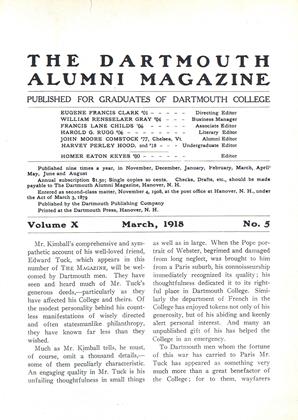Quartermaster General Goethals has appointed President Ernest Martin Hopkins as Director of the Bureau of Industrial Relations in the Quartermaster's Department. The work covers the two divisions of personal supervision on the one side, and labor adjustments with industries with which the department has connection, on the other side. President Hopkins left Hanover for Washington on January 23; he expects to return for short periods from time to time.
The following interesting editorial comment on the appointment appeared in the Boston Transcript:
"President Ernest M. Hopkins of Dartmouth, in assuming charge of industrial relations within the quartermaster-general's department of the Army, goes to a service in which he had previously won title as expert. Throughout his connections with the world of modern business, he always made the field of industrial relations especially his own, and within it was given some large human situations to manage by the corporations employing him. His assets in this work proceed in the first instance from the ruggedness and breadth of his social and human views, and in the second instance from that faculty which, for lack of a better name, is known as 'organizing power.' First principles appeal to him, whether as the chief executive of a college or as a man of business, and he carries with him an ability to construct practical measures on the basis of these principles—to deal with them in the concrete as well as in the abstract —that should serve Acting Quartermaster General Goethals in good stead.
"The college at Hanover stands for a time as the loser in the bargain. Mr. Hopkins had not been long enough in charge there, one assumes, to have done more than start all things in the way he would like to see them go, not to get them going of their own momemtum. Fortunately, his absence will be but temporary, and devoted to a cause now greater than any whether of individuals or of institutions—the work of the war."
 View Full Issue
View Full Issue
More From This Issue
-
 Article
ArticleCOLLEGE NEWS
March 1918 -
 Article
ArticleEDWARD TUCK '62
March 1918 By Benjamin A. Kimball '54 -
 Article
ArticleMr. Kimball's comprehensive and sympathetic account of his well-loved friend,
March 1918 -
 Sports
SportsBASEBALL
March 1918 -
 Books
BooksAlsace-Lorraine Under German Rule
March 1918 By FRANK MALOY ANDERSON -
 Class Notes
Class NotesCLASS SECRETARIES
March 1918








